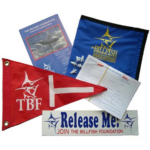On December 7th, 2009, The Billfish Foundation visited the Sea, Sand and Stars Science and Nature Center at Orange Beach Elementary School in Orange Beach, Alabama. TBF’s Science and Policy Specialist, Elliott Stark, lead a group of 54 sixth graders in TBF’s first ever Ecology Workshop. Under Stark’s guidance, the students learned about marine physiology, ocean processes and the importance of conservation.
The Ecology Workshop, part of TBF’s Youth Education Program, included an interactive presentation about the oceans and the local marine environment, complete with a get-your-hands-dirty demonstration about the function of fish anatomy looking at Spanish mackerel and ballyhoo. Students learned how the shape of a fish’s tail fin can be used to determine how fast the fish swims, the hydrodynamic shapes fish use to conserve energy, why your hands wrinkle when you go swimming, the reason for the deep ocean’s blue color and how fish regulate their internal fluid composition while swimming through the oceans (the answer lies in special cells on their gills which excrete excess salts).
Stark and the students talked about wetlands and estuaries in relation to their importance to both humans and fish alike. Nearly 90% of all recreationally-caught fish depend on estuaries during at least one phase of their development. Throughout the years, this biological productivity has not gone unnoticed. Students left the workshop armed with knowledge to impress their buddies and fellow fishermen a like. They learned that 22 of the 32 largest cities in the world are located on estuaries (including Houston, New York, Tokyo, Miami and New Orleans, to name a few). Estuarine areas provided a source of freshwater, port and harbor areas for ships and abundant supplies of seafood, all of which made them suitable places for colonists to settle.
With the presentation complete, students demonstrated their new-found knowledge by handling Spanish mackerel and ballyhoo. By looking at the tail shape and jaw anatomy, students determined what types of strategies each used while feeding and escaping from predators. The mackerel, with rigid, sickle-shaped tails, catch their prey through rapid bursts of speed. The ballyhoo, with flexible, shorter tails, are more maneuverable in close quarters than the mackerel. Any angler who has watched the frustration of a kite bait ballyhoo flitting around the bill of a sailfish understands the implication of what the students learned firsthand.
TBF would like to thank Orange Beach Elementary and all of the students and teachers who made the Ecology Workshop such as success.






